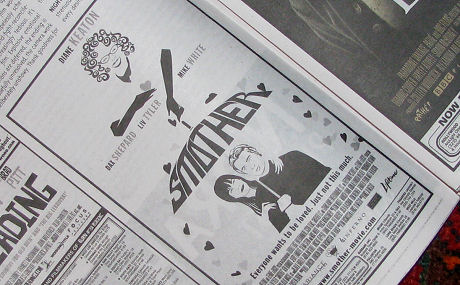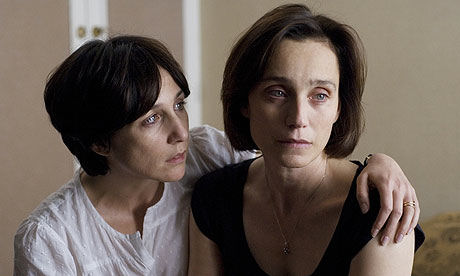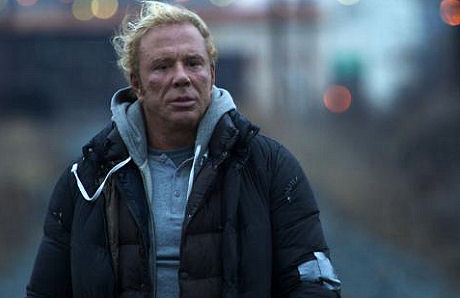Obama came off better than McCain tonight — he’s clearly brainier and more exacting and got in some very good points and zing lines, and he sure as hell didn’t let McCain get away with any of his blah-blah routine — but he wouldn’t do the street-fight thing. He wouldn’t punch or kick or do the slap-down. McCain was the snarly one. The grouch, the jabber, the bulldog prick who wouldn’t stop smirking and making faces and going “heh, heh, heh.”
Obama reportedly did better with independent voters, but I wanted him to be Mike Tyson for a moment or two. The fact that it’s just not in him may as well be faced. He is who he is — cautious, brilliant, mild-mannered, thoughtful, exacting, steady. But he’s not a pit bull and not someone looking to take a swing. And he never will be.
The significant thing, I think, is that McCain never looked at Obama. Never. He was in his own world. When Obama was speaking McCain was smirking, grimacing, giving off those little “God, I can’t believe I have to stand here and listen to this!” looks as he stared at his notes or the floor…the kind of look that a guy gets into when he’s being chewed out by his wife.
As MSNBC’s Chris Matthews said, “Obama refused to get emotional, never went for the jugular, never talked about the gritty reality. He could have done a helluva better job tonight of talking about what’s really hurting out there.” But Obama — there’s no question about this — held his own. He acted and sounded like a President. And he apparently came through with more debate points than McCain did.
Day: September 26, 2008
‘Nother Button Touch
Wait…I’ve seen this supposedly newish trailer for David Fincher‘s The Curious Case of Benjamin Button (Paramount, 12.25). It looks better in high-def, of course. Glorious, in fact. The exquisite visual quality tells you it’s a first-rate dreamscape experience. Eric Roth‘s screenplay is, take it from me, delicate, eloquent and quite moving. The question, of course, is will it all coagulate?
In Passing
It’s been one of those distracted days. Only six stories today…shameful. I have to get over to a restaurant/bar in Santa Monica called R + D Kitchen on Montana to see the debate at 6 pm, and then walk across the street to the Aero theatre for a 7:30 screening of The Baader Meinhof Complex, which got panned today by Variety.
Valkyrie Necessity
It’s no secret that the plot by German military officers to assassinate Adolf Hitler in the waning days of World War II failed, and that the conspirators — including Col. Claus von Stauffenberg, the character portrayed by Tom Cruise in Valkyrie — were shot. So it’s no spoiler to say that I want to see Cruise eat lead at the end of Bryan Singer‘s long-awaited historical thriller.
I want to see him grimace, convulse and fall to the ground. No cutaways, no panning up to gray skies over Berlin as the execution squad captain yells “fire!” and no Che-style POV shots ending with a fade-to-white because Soderbergh owns that for now. Not because I dislike Cruise — I never have — and want to see him “shot”, but because that’s the story and because Stanley Kubrick didn’t cut away when those three soldiers were executed in Paths of Glory. And neither did Bruce Beresford in his Breaker Morant execution scene.
I’m saying this because the Hollywood political rulebook states on page 27 that movie stars rarely die on-screen in brutually realistic fashion. They die off-screen like Gary Cooper did in For Whom The Bell Tolls, or like Paul Newman and Robert Redford did in Butch Cassidy and the Sundance Kid. They talk things over and say their peace before they die. They die with dignity like Marlon Brando did in Last Tango in Paris. They die quietly (like Leonardo DiCaprio‘s death from hypothermia in Titanic) and then ascend to heaven.
I’m just saying that cutting away when Cruise and his co-conspirators get shot at the end will be a chickenshit kowtow move on the part of Singer. Fair warning.
In The Rough
“Does Diane Keaton owe some loan sharks a considerable amount of cash?,” asks critic Brian Orndorf in his review of Smother (opening 9.26). “Are there incriminating photos of her that she’s trying to keep out of circulation? I’m having trouble understanding why Keaton would, over the course of a single year, take part in both Mama’s Boy and now Smother.

“Perhaps she was poisoned by merciless Asian gangsters with strict instructions to make two career-denting comedies that methodically peel away her integrity before she was allowed the sweet kiss of a life-saving antidote. Heavens, I hope that’s the impetus behind these recent professional decisions, otherwise Keaton has lost her mind.
And what about Keaton’s other two recent stinkers — Mad Money (’08) and Because I Said So (’07)? Has she had her taste buds surgically removed?
“Remember when Keaton was once choosy with her roles,” Orndorf concludes, “waiting years to appear on the big screen in just the right starring vehicles? If the prospect of sharing the frame with Dax Shepard now makes Keaton sprint to the set with pride, it’s obvious those award-winning, reputation-fostering days are over.”
What a comedown from the glory days of The Family Stone (’05), a landmark holiday comedy in which Keaton gave one of her best performances ever. Not to mention another triumph two years earlier when she won a Best Actress nomination for her work in Something’s Got To Give.
Hypersensitive Awareness
“The presence of Kristin Scott Thomas in Philippe Claudel‘s I’ve Loved You So Long is so powerfully distinctive,” the Guardian‘s Peter Bradshaw notes, “that it’s as if Claudel has not merely written the lead role for her, but extrapolated his film’s entire narrative structure from Scott Thomas’s personality.

Elsa Zylberstein, Kristin Scott-Thomas in I’ve Loved You So Long
“Her formidable bilingual presence, her beauty — elegant and drawn in early middle age — her air of hypersensitive awareness of all the tiny absurdities and indignities with which she is surrounded, coupled with a drolly lenient reticence: it all creates an intelligent, observant drama about dislocation, fragility and the inner pain of unshakeable memories. Scott Thomas is on screen for almost every minute of the film, often in close-up and her face is at once eloquent and deeply withdrawn.”
Balloon Up Front
I’ve decided to double-post the Oscar Balloon — it’s on the main page (ten items down from the top) as well as on its own page. Somehow it got un-designed as a result of the server switchover so it has no tint or flair or anything — it looks awful right now. (But it’ll be fixed this weekend. I hope.)
I’ve tried to prune out the stragglers and the good-but-not-good-enoughers. Josh Brolin‘s lead performance in W. is the the latest surge in the Best Actor category. Unless reports come in to the contrary, experience has taught me that anything to do with Ed Zwick (such as Defiance) is a non-starter. I think Angelina Jolie is looking good for Best Actress in Changeling, but I’m not so sure about the film or director Clint Eastwood in their respective categories. I obviously have some work to do on the Best Foreign Feature front.
Any and all suggestions are welcome.
Rourke Has Come Through
L.A. Weekly critic Scott Foundas has posted a frank, perceptive, and typically well written profile of Mickey Rourke, star of Darren Aronofsky‘s The Wrestler (Fox Searchlight, 12.19), an almost-certain Best Actor nominee and by general consensus the Comeback Kid of 2008.
The timing of Foundas’s article is a little unusual — a few weeks after The Wrestler was hailed at the Toronto and Venice film festivals, and nearly three months before it’ll open commercially. Obviously Foundas is foresaking the usual considerations to say to the industry, the press and the cognoscenti at large, “This is a major return-to-form performance by an actor who deserves not only respect but accolades — a man who has suffered and wandered in the wilderness for his sins, and has returned with a performance that not only delivers in terms of great chops and emotionality, but which has unmistakable real-life echoes.”
“‘I hated the ’90s…the ’90s fuckin’ sucked,’ says professional wrestler Randy ‘The Ram’ Robinson early on in The Wrestler — and he should know,” Foundas begins. “Over the hill and past his prime — his steroidal body a palimpsest of battle scars, his graying hair dyed a Nordic blond — Robinson hasn’t seen the inside of a major arena for the better part of 20 years. Nowadays, he gets top billing by scraping bottom, trading blows with other used-to-be’s and might-have-beens in school gymnasiums and banquet halls, earning a cut of the door that’s barely enough to cover his trailer-park rent.
“As it happens, the ’90s weren’t much kinder to the actor playing Robinson: Mickey Rourke. By the end of that misbegotten decade, the one-time Hollywood A-lister was living in a $500-a-month studio apartment and subsisting on a meager income generated by the sale of his motorcycle collection plus whatever acting jobs he could scrounge up from the few producers in town who weren’t afraid to hire him.

“His flirtation with a boxing career had come to an end. His tabloid-catnip marriage to model Carre Otis had hit the skids. There were reports of arrests and of plastic surgeries gone awry. It was said he had walked off the set of one movie after a producer refused to allow Rourke’s pet chihuahua to appear with him in a scene.
“‘The thing is that I am the one to blame for all that,’ Rourke says as he lights a cigarette in what I’m pretty sure is a nonsmoking suite at the Four Seasons Hotel, the day after The Wrestler‘s North American premiere at the Toronto Film Festival. His chihuahua, Loki, issues a bark from a nearby cushion. ‘I used to blame other people, but I’ve got nobody else to blame except for Mickey Rourke.’
“That’s more or less the same thing Rourke told director Darren Aronofsky (Pi, Requiem for a Dream) when they first met to discuss The Wrestler. Or rather, it was what Aronofsky told him.
“‘He sits down and, for the first five minutes, he tells me how I fucked up my whole career for 15 years behaving like this, and I’m agreeing with everything,’ Rourke recalls. ‘Yes, I did. That’s why I haven’t worked for 15 years, and I’ve been working real hard not to make those mistakes.’ After that, Aronofsky pointed his finger at the actor — something, Rourke says, that not so long ago would have prompted him to say, ‘Don’t do that, okay, buddy?’ — and laid out the ground rules.
“‘He goes, ‘You have to listen to everything I say. You have to do everything I tell you. You can never disrespect me. And you can’t be hanging out at the clubs all night long. And I can’t pay you.’ And I’m thinking, ‘This fucker must be talented, because he’s got a lot of nerve to say that.'”
“Then Aronofsky told Rourke that if he did all of those things, he would get the actor an Oscar nomination. ‘The moment he said that, I believed him,’ says Rourke. ‘The first day of work, I believed him more. The second day of work, I believed him even more.’ As for the finger-pointing, ‘I’m from New York — we point a lot,’ Aronofsky tells me later. ‘Like any good marriage, you want to be as up-front as possible about what the issues are.'”
Sidenote: I’m expecting to see The Wrestler before too long. I got shut out of the big Toronto press screening at 3 pm, and the next day I decided to blow off another Wrestler screening — a public one — so as not to miss a 12 noon press screening Kathryn Bigelow‘s The Hurt Locker. The Toronto Film Festival is full of unfortunate do-or-don’t decisions like this.
